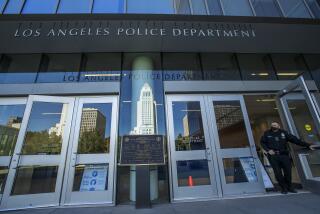Garcetti to Cut Unit That Probes Police Shootings : Budget: District attorney says the program’s costs cannot be justified. But some observers say move sends the wrong message.
Even though it fared far better than most other departments when the Los Angeles County budget was passed, the district attorney’s office Friday informed its staff that prosecutors will be cut from important specialized units, including a high-profile group that independently investigates police shootings.
In a memo issued to district attorney’s employees Friday, a top aide to Dist. Atty. Gil Garcetti warned that budget cuts of $4 million--coupled with $2 million in new and unexpected costs--will “impose considerable additional burdens on an already terribly overworked and tired staff.”
In an interview, Garcetti said: “Obviously, we are cutting back on our ability to investigate as fully as we want to. But the money simply isn’t there.”
Chief Deputy Dist. Atty. Sandra L. Buttitta said in the memo that the office will be eliminating staff attorney and investigator positions in a host of specialized units. Those units include major crimes, environmental crimes, hard-core gang prosecutions, Asian crime and bad checks, said Assistant Dist. Atty. Dan Murphy. The office will lay off its only investigator assigned to the county grand jury. In all, Murphy said, 13 prosecutors and six investigators will lose their jobs.
Also, Buttitta said in the memo that the district attorney’s office must institute a hiring freeze for at least six months. She added that district attorney’s employees--like other county workers--also will lose four day’s pay each year because of Christmas week furloughs.
But the most visible effect of the reductions, Garcetti said, is also the most symbolic. By Sept. 1, he said, the office will cut the “roll-out” program, in which a prosecutor and investigator “roll out” and conduct independent investigations at all crime scenes in which a police officer shoots someone or a suspect dies while in custody.
Garcetti, who created the program in the late 1970s as a way of ensuring unbiased investigations of shootings by police, said Friday that roll-out’s $1-million annual cost does not justify its continuation in such bleak budgetary times. Garcetti said only a handful of the 200 or so cases investigated each year by prosecutors in the Special Investigations Division lead to charges being filed, and even fewer result in the conviction of police for improper shootings that hurt or kill people.
“This [roll-out] is a good thing to do, but these [cases] are few and far between,” Garcetti said. “I’d rather be prosecuting violent criminals than going out and ratifying that police officers did not commit improper shootings.”
Garcetti said the decision means that his office won’t involve itself even in the most controversial of police shootings--such as the one last weekend in Lincoln Heights--unless police agencies come forward with a request for a criminal filing.
Vina Camper, intake coordinator for the watchdog group Police Watch, said elimination of the program sends a message to residents, particularly those in minority communities, that the county does not care about improper police shootings.
“It concerns us,” she said. “It will exacerbate the feeling that there is no confidence in the investigation of police shootings.”
The county’s chief administrative officer, Sally Reed, also questioned the decision, saying the office still has well over 700 prosecutors, and that the 4% budget cut it took this week was far less than the 20% suffered by most other county departments.
“I guess I don’t believe it, that with at least 750 prosecutors or more, that the district attorney in Los Angeles County will decline to look into shootings where an officer has killed someone,” Reed said. “I have no way of assessing whether it is necessary to appear at all shootings, but I would suspect that it is possible to distinguish those likely to require further investigation, those that appear improper, from those that do not.”
In response, Garcetti said: “The board [of supervisors] members knew this was a likely scenario. I have to prioritize.”
Of far more concern, Garcetti said, was his office’s decision to pare down the special prosecution units, which were created to track Southern California’s most dangerous and career criminals. Some of the units have so few staffers that the reductions will slash their units by a third, Garcetti said.
“We are troubled by having to remove people from these units,” Garcetti said. “Already they are very small. Obviously we are cutting back on their ability to investigate as fully as we want them to, but the money simply isn’t there.”
Anthony G. Patchett, assistant head deputy of the environmental crimes division, said his unit has been pared down significantly in the past, and the loss of at least one investigator means fewer cases will be prosecuted. “We have a very high caseload and these cases are very complicated, requiring a lot of investigation and preparation,” he said. “If you don’t have an effective law enforcement system, everything else is going to break down.”
More to Read
Sign up for Essential California
The most important California stories and recommendations in your inbox every morning.
You may occasionally receive promotional content from the Los Angeles Times.










